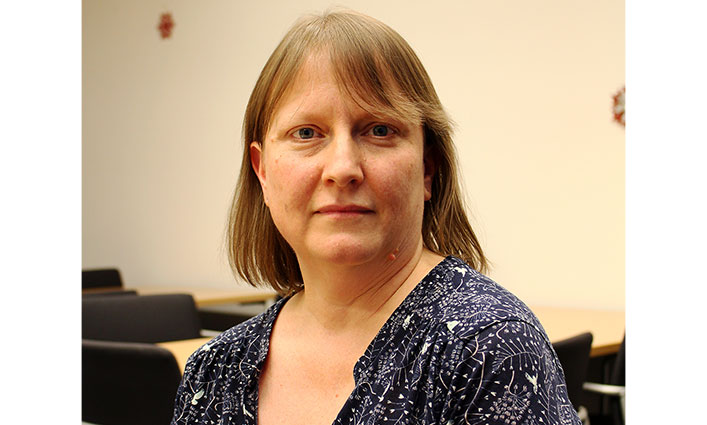
Studying the brain might not be what comes to mind when you think of cyber security, but Jennifer Holst did just that for her graduate level thesis. As part of her Digital Forensics and Cyber Security master’s program, she looked at raw EEG data to take what we know about the characteristics of internet traffic and apply it to the human mind. Holst graduates this year with her M.S., but because of her academic success, she’s already teaching as an adjunct professor in the Mathematics and Computer Science Department.
Bridging the gap between understanding computers and understanding the mind reflects Holst’s previous background in psychology and tech. Before coming to John Jay, she graduated with a B.S. in Psychology and went on to work in online forum moderation and visual merchandising. She learned about tech from the programmers she worked with, but other than that, her knowledge of computer science was limited.
But that didn’t stop her from pursuing her dream of learning about cyber security. In order to get up to speed for the master’s program, she took several undergraduate John Jay courses, even surpassing the number of credits needed to enroll. “I took more classes than I had to because I wanted to get a better handle of the field,” she says. “I basically had enough credits to claim it as an undergraduate major.”
Holst says there’s a shortage of people who are highly skilled in digital forensics and cyber security, and she sees great potential for her career. As platforms like Facebook are being scrutinized for what seem to be grave violations of privacy, the field of cyber security seems to be growing more rapidly than ever before. Holst is particularly intrigued by how criminal justice interacts with data security. “Companies have teams that will conduct investigations into data breaches,” she says. “Figuring out what to do once a breach has happened and doing those investigations is something I’d want to do.”
“Companies have teams that will conduct investigations into data breaches. Figuring out what to do once a breach has happened and doing those investigations is something I’d want to do.”
—Jennifer Holst
During her time at John Jay, Holst was able to work closely as a research assistant with Dr. Aftab Ahmad, Associate Professor in the Department of Mathematics and Computer Science. She wrote program files that other students were tasked with “reverse engineering” in labs, meaning they figured out exactly how Holst had written them. Holst also tutored at the Computer Science and Statistics Data Center, which helped prepare her to teach. This spring, Holst is teaching an Introduction to Programming class as well as a class in the certificate program CSIBridge, a program that is ideal for working professionals looking to learn more about computer science.
As an adjunct professor, Holst is thrilled to share her passion with other John Jay students so they can one day become leaders in the field. “Much of our lives are lived online,” she says. “We are always connected, but there’s a trade-off there between convenience and security. It’s exciting to have the opportunity to make a safer cyber environment.”



